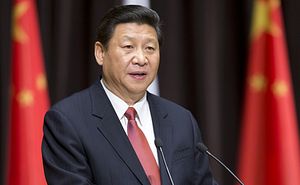September 30, 2015 marked a new beginning in Chinese politics — the start of a new era in Xi Jinping’s authority. On this day, the State Council hosted a dinner celebrating the 66th anniversary of the People’s Republic of China. In contrast to the past, when retired senior leaders were invited to join the current leaders to partake in the celebrative banquet, most of China’s previous leaders were absent this time.
It is not that they were too old. Less than one month earlier, on September 3, almost all of former Politburo Standing Committee members had just appeared at a military parade marking 70 years since the end of World War II in Asia. The oldest former Politburo Standing Committee member present at the military parade was Song Ping, at 98 years old. Former President Jiang Zemin, who was stood next to Xi on the left, had just turned 89. Other octogenarians who were present at the military parade but absent from the State Banquet include former Premiers Li Peng and Zhu Rongji as well as Li Ruihuan, Li Lanqing, and Luo Gan.
Even many former leaders who are younger than 80 were also visibly absent from the National Day state banquet, including former President Hu Jintao, former Premier Wen Jiabao, and former Vice President Zeng Qinghong as well as Wu Guanzheng, Wu Bangguo, Jia Qinglin, He Guoqiang, and Li Changchun.
Their absence from the state banquet, however, should not be construed as a sign that any of them have been placed under investigation for corruption. True, there is no clear evidence that they are all clean, though it is likely that the families of some of these former leaders are far better off financially than those of others. But with the exception of Zhou Yongkang, there are no signs that other former Politburo Standing Committee members are under investigation. It is simply too costly politically to cast all retired Politburo Standing Committee members in the category of suspects of corruption.
It is possible that their collective absence was a decision made by Xi alone, and not for any obvious reasons. These former leaders were invited for the military parade because Xi wanted it, and they were not invited to the state banquet because he did not like it. These powerful former leaders now have to come and go with a simple wave of Xi’s hand.
From this point of view, Xi’s power has already surpassed that of Deng Xiaoping, who took years to persuade his colleagues to semi-retire from the Politburo and the Central Committee of the Chinese Communist Party to the Central Advisory Commission. Xi now commands power equivalent to that of Mao Zedong, who purged his colleagues en masse in the beginning of the Cultural Revolution in 1966.
With this quiet demonstration, the era of Xi Jinping has now been inaugurated.

































